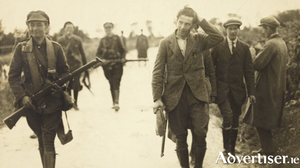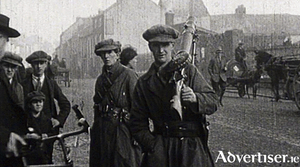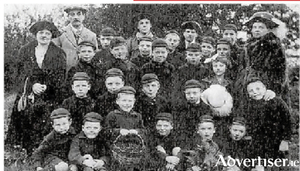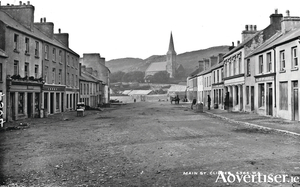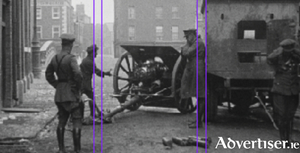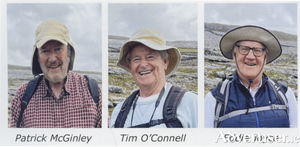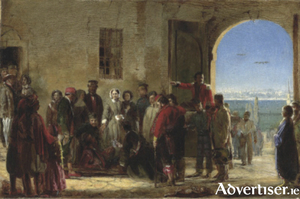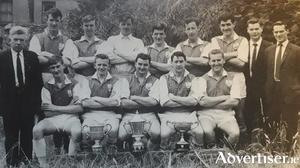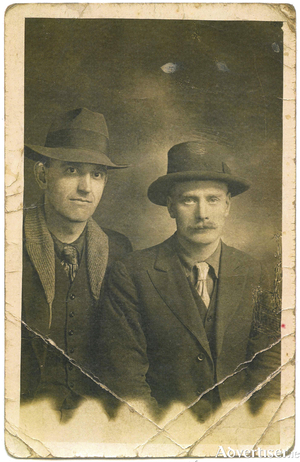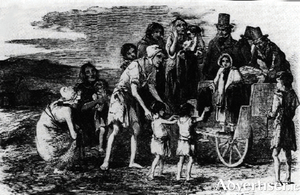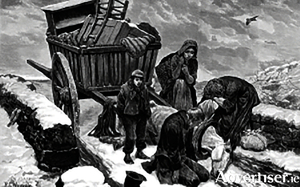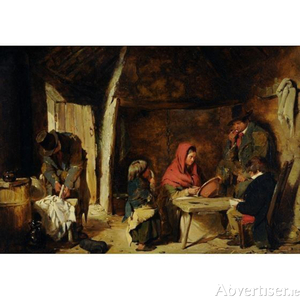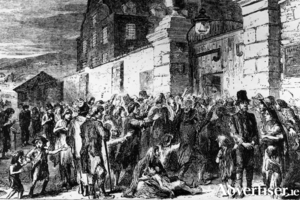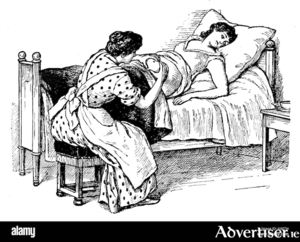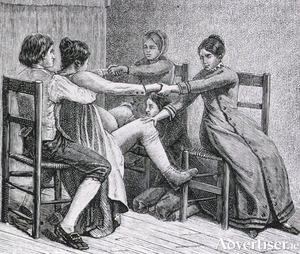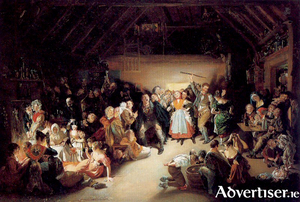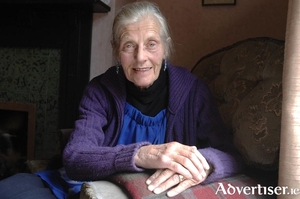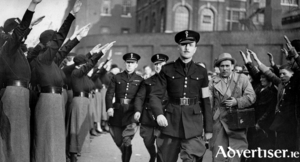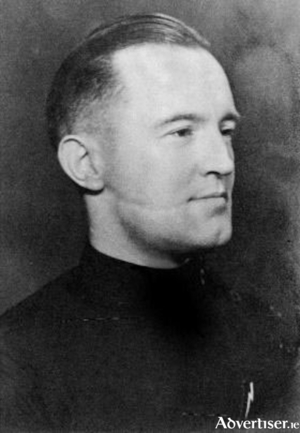‘The girl we left behind us’
Thu, Feb 16, 2023
In the immediate aftermath of the recapture of Clifden by the anti-Treaty forces on Sunday 29 October 1922, the town was in a mess. Every house on Main Street had its windows and doors shattered. The streets were littered with glass as a result of explosions. In the houses opposite the barracks ‘not a picture remained on the walls, nor a piece of furniture unscathed’. Porter and spirits ‘flowed out the door’ of Lavelle’s pub. The ‘armoured car’, which had caused so much surprise, and gave cover to allow bombs to be placed, was removed and abandoned at Killery. It was noted that for the first time in living memory there were no church services in Clifden that Sunday.
Read more ...Anti-Treaty forces ‘secret weapon’ helps recapture Clifden
Thu, Feb 09, 2023
On Saturday night, October 28 1922, a large force of anti-Treatyites made their way carefully and with as little noise as possible, into the silent streets of Clifden. They had already ‘taken’ Clifden the previous July, but were unceremoniously driven out by the National Army who approached Clifden by sea achieving total surprise.
Read more ...The Protestant Boys orphanage at Clifden
Thu, Feb 02, 2023
Even though the National Army ousted the anti-Treaty forces from Clifden in August 1922, they had not gone away. They still remained a threatening force, well armed and determined. Ever since the Black and Tan war the so called Connemara Flying Column, still under the leadership of Peter McDonnell, Gerald Bartley and others, were firmly on the anti-Treaty side. They were familiar with the path-ways and mountain hide-outs, which made them virtually invisible in times of pursuit.
Read more ...Monsignor McAlpine would not take orders from boys he had baptised
Thu, Jan 26, 2023
After sporadic fighting in Galway during the summer of 1922, and the occupation of some buildings in the town, including the old RIC barracks in Eglington Street, and the former Connaught Ranger barracks at Renmore, the anti-Treaty forces withdrew into Connermara, and into the east Galway countryside.
Read more ...Firing squads and street battles in Galway
Thu, Jan 19, 2023
‘My dearest mother,
I again write you a few lines, but oh Mother it is going to be the last. The last word to you on this side of the grave, as I am going to meet my great God tomorrow morning. But Mother Dear, don’t grieve for me as I am prepared to meet him who created me, to his likeness. But Dear Mother I know it shall grieve you all, but I ask one request of you not to worry but to pray for me because one prayer goes longer for me than all the sad tears that a nation could shed.
Night of the Big Wind, or The End of the World
Thu, Jan 05, 2023
There have been violent storms before and since the Big Wind of Sunday 6 to Monday 7 January 1839, but it was generally agreed at the time that nothing comparable could be remembered by the oldest inhabitants of this island.
It began with people noticing that despite a period of dull, cold weather, with light snow showers in the afternoon of that Sunday, it became noticeably warm with a light breeze. By late afternoon it was noted that the air ‘felt like air in a hot house’. About 9 pm strong westerly winds swept over the entire country, developing into hurricane force which raged from about midnight until it finally subsided at about 5am the following morning.
Read more ...Hitting the Burren trail with Galway’s Three Amigos
Thu, Dec 22, 2022
We are fortunate to live in Galway and to have the Burren within shouting distance. Some 15,000 hectares of a unique landscape that miraculously contain all the major habitats found on this island.
Read more ...Rats ate the nuns’ Christmas dinner
Thu, Dec 15, 2022
In the hopelessly disorganised Allied army which fought Russia in the Crimean War 1853 - 1856, 15 Sisters of Mercy from Ireland played an heroic role in establishing revolutionary nursing practices in the chaos of the terrible hospitals of the day. They undoubtedly saved hundreds of lives, and brought comfort to the young injured and dying men, and laid out principals for modern nursing which were widely regarded as the standard for decades to come.
Read more ...John Keady, a tribute
Wed, Dec 14, 2022
Now that we are reaching the end of saturation coverage of the World Cup and watching some of the best soccer players in the world, you might wonder where it all began for some of them, how they got themselves on to the world stage, and how much they owe to the unsung people without whom they would never have succeeded, the referees whose dedication to the game make all of those matches possible.
Read more ...Liam Mellows, enigmatic republican and notorious irreconcilable
Thu, Dec 08, 2022
William Mellows was born in Ashton-under-Lyne, Manchester, where his father, Staff Sergeant William Mellows, was then stationed. His father had ambitions for the son to become the fourth generation of the family to serve in the armed forces, but after they moved back to Ireland, Liam became steadily disillusioned with the British Government. He lived in Dublin for a time and spent a lot of time living in his grandparents' house in Co Wexford, where his mother came from.
Read more ...A band of doctors saved Galway from typhus wipe-out
Thu, Dec 01, 2022
Week II
Barely 70 years after the famine and disease of the 1730s, the West of Ireland was hit by a second outbreak of typhus which was slowly making its ruinous journey through the whole county. Its cause, yet again, was triggered by famine which followed the poor harvests of 1816 and 1817. The summer and autumn of 1816 were wet and cold, resulting in rotting potatoes and mouldy oatmeal. The incessant rain prevented the saving of turf on which the people depended for heating and cooking.
Harsh winter weather leads to severe famine
Thu, Nov 24, 2022
Harsh winter weather leads to severe famine.
November 1739 was bitterly cold with constant northeast winds culminating in a prolonged period of intense frost which started from about the middle of December and continued for 8 to 9 weeks. The frost killed birds in large numbers. Even sheep died from the cold. Turnips were destroyed as well as trees and shrubs. Galway’s great historian James Hardiman records that ‘the river was frozen from the bridge to the mouth of Lough Corrib, and continual recreations were held on the ice from Woodquay to Newcastle and Terrilan. This memorable winter was followed by famine and pestilence in which multitudes of the poor perished’.
‘Neither by wine nor by gold was her evidence bought’
Thu, Nov 17, 2022
Week III
The extraordinary case of Dr James Connolly, who was summoned to appear at a sworn inquiry by the Local Government Board in November 1876, after been asked by Patrick Barrett to come to his home as his wife was in labour and in distress. The doctor had refused, showed every appearance of being drunk, and used obscene language. When, some eight hours later, he eventually did call to the Barrett home, a still born child was delivered.
Dr Connolly admits to taking ‘the occasional glass of ale’
Thu, Nov 10, 2022
The complaint made against Dr Connolly, the medical officer of the Moycullen dispensary district in October 1876, for neglect of duty, drunkenness and using improper language on the evening that Patrick Barrett’s wife was gravely ill in child-labour, was taken very seriously by the Local Government Board. At a disastrous first meeting between the Board’s inspector, Dr T Brodie, with the members of the Dispensary Committee, and Connolly, Connolly completely lost his rag. He insulted the committee, claiming they were ganging up against him, and had pushed himself against the committee’s chairman, John Kyne, in a threatening manner. So it must have been with some interest that the Board awaited a letter from Connolly offering some explanation for his extraordinary behaviour. Of course the letter, when it arrived, was charm itself. Connolly immediately stated that Mrs Anne Barrett ‘sustained no injury’ from the time between the ticket (supplied by the Relieving Officer, which entitles the bearer to a free service), delivered to the doctor’s housekeeper, and ‘the few hours delay’, that the doctor took to see the patient. Furthermore the doctor claimed he was frightened of Patrick Barrett’s, threats. His housekeeper was alarmed when she heard Barrett say that ‘he would have the doctor’s life’. The letter went on to say that Tom Conneely, Barrett’s brother-in-law, who accompanied Barrett that night, was asked the next day about the patient, repeated that Barrett had said, if ‘the doctor goes to Ballinahalia he will not return alive’. Of course this was a blatant lie. Conneely worked for John Geraghty, the most powerful man in Moycullen, who owned a pub, and the post-office. In addition he was the poor-law rate collector, and a friend of Dr Connolly. The doctor’s letter goes on to explain that a few years ago a gentleman’s windows were smashed at night, and that the police had questioned Barrett about the incident. ‘A threat from such a person’, the doctor wrote, ‘might justly excite terror’.
Read more ...Distraught husband said doctor was drunk
Thu, Nov 03, 2022
On October 2 1876 Patrick Barrett of Ballynahalia, wrote a long letter to Dr T Brodie, the Local Government Board inspector, bitterly complaining about Doctor James Connolly, who failed, ‘through drunkenness’, to promptly attend his heavily pregnant wife. Barrett demanded a sworn inquiry into the whole sorry business, causing a row that fiercely divided the community of Moycullen, where old loyalties silenced witnesses from giving evidence, leading to a stunning finale of bribery and corruption that would turn the one street county Galway village into a Ken Bruen landscape. Barrett, accompanied by his brother-in-law Tom Conneely, set out briskly to call Dr Connolly, the local dispensary doctor, as his wife, Anne, was dangerously ill in child labour. The doctor’s housekeeper told them the doctor was gone into Moycullen, and not expected home till around 10pm. The two men walked to Moycullen as fast as they could. Just as they passed John Turner’s public-house they saw the doctor standing by the wall. The doctor began to move off towards John Geraghty’s pub, when Barrett asked him to come to his home immediately as his wife was very ill. The doctor asked: ‘Have you a ticket? (at that time for a doctor to make a home-visit a ticket had to be got from Mr Griffin, the Relieving officer for the area), Barrett said ‘No’, but if the doctor came he would get a ticket later. The doctor then asked Barrett to give him one shilling for his fee, to which Barrett replied that he had no money. Doctor Connolly turned away saying: ‘Go to the devil, or to the poor-house’, followed by abusive and derogatory language too unseemly to be included in the report. The doctor walked away leaving Barrett ‘excited’, and at the point where he almost lost his temper; but instead, he thought he would have the law on him. ‘Do I have to go into Galway to get a doctor?’ he asks.
Read more ...Distraught husband said doctor was drunk
Wed, Nov 02, 2022
On October 2 1876 Patrick Barrett of Ballynahalia, wrote a long letter to Dr T Brodie, the Local Government Board inspector, bitterly complaining about Doctor James Connolly, who failed, ‘through drunkenness’, to promptly attend his heavily pregnant wife. Barrett demanded a sworn inquiry into the whole sorry business, causing a row that fiercely divided the community of Moycullen, where old loyalties silenced witnesses from giving evidence, leading to a stunning finale of bribery and corruption that would turn the one street county Galway village into a Ken Bruen landscape. Barrett, accompanied by his brother-in-law Tom Conneely, set out briskly to call Dr Connolly, the local dispensary doctor, as his wife, Anne, was dangerously ill in child labour. The doctor’s housekeeper told them the doctor was gone into Moycullen, and not expected home till around 10pm. The two men walked to Moycullen as fast as they could. Just as they passed John Turner’s public-house they saw the doctor standing by the wall. The doctor began to move off towards John Geraghty’s pub, when Barrett asked him to come to his home immediately as his wife was very ill. The doctor asked: ‘Have you a ticket? (at that time for a doctor to make a home-visit a ticket had to be got from Mr Griffin, the Relieving officer for the area), Barrett said ‘No’, but if the doctor came he would get a ticket later. The doctor then asked Barrett to give him one shilling for his fee, to which Barrett replied that he had no money. Doctor Connolly turned away saying: ‘Go to the devil, or to the poor-house’, followed by abusive and derogatory language too unseemly to be included in the report. The doctor walked away leaving Barrett ‘excited’, and at the point where he almost lost his temper; but instead, he thought he would have the law on him. ‘Do I have to go into Galway to get a doctor?’ he asks.
Read more ...The origin of Halloween
Wed, Oct 26, 2022
The origin of Halloween lies in the Celt's Autumn festival which was held on the first day of the 11th month - the month known as November in English, but as Samhain in Irish.
Read more ...A lone figure at Bohermore cemetery
Thu, Oct 20, 2022
William Joyce recorded his final broadcast on April 30 1945 as the last great battle of the war raged. Russian troops, after a desperate struggle, finally wrenched Berlin from the grip of the Nazis. The once great city was then little more than streets of rubble. In an iconic World War II photograph Soviet troops fly the Soviet flag over the Reichstag May 2 1945.
Read more ...‘Irish dockworkers fought elbow to elbow with old Jewish men in Hasidic hats...’
Thu, Oct 13, 2022
William Joyce’s notorious broadcasts to Britain, which continued throughout the six years of World War II, initially came from the studios in Berlin, later transferred to Luxembourg city, due to heavy Allied bombing, and finally from Apen, near Hamburg. The broadcasts were relayed over a wide network of German controlled radio stations in Zeesen, Hamburg, Bremen, Luxembourg, Hilversum, Calais, and Oslo. It had a huge potential audience, and was seen as a vital propaganda tool for Nazi Germany.
Read more ...The boy from the Jes, who became the voice of Germany
Thu, Oct 06, 2022
The late Billy Naughton, College Road, said he spluttered into his cup of tea, when he instantly recognised the upper-class, nasal drawl, of William Joyce reporting continuous Nazi victories on Radio Hamburg, Reichsrundfunk, during its English-language broadcast in October 1939. He was ridiculed as ‘Lord Haw-Haw’ and was the butt of Musical Hall jokes, yet he was listened to and despised for his clever mix of fact and lies.
Read more ...